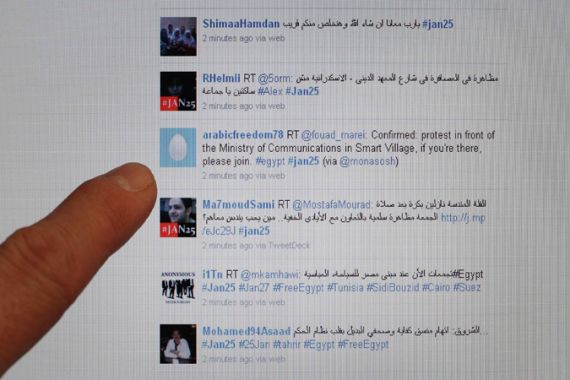Despite hoaxes, anonymity remains important
After an American admitted inventing the “Gay Girl in Damascus” character, the validity of blogs has been questioned.

 |
| Anonymity is vital for many bloggers from marginalised communities or those writing in conflict zones [GALLO/GETTY] |
Over the past few weeks, much of the world’s attention was captured by the story of supposed Syrian blogger Amina Arraf, also known as “Gay Girl in Damascus”.
From reports on June 6 of Arraf’s alleged kidnapping by Syrian security forces to the June 12 confession from American Tom MacMaster that he had fabricated Arraf’s entire persona, the story unfolded rapidly, leaving the public confused in its wake.
Central to this story is the role that traditional media played in perpetuating what is now known to be a hoax. Though the persona of Amina Arraf was created as early as 2007, Arraf’s blog did not gain prominence until earlier this year when, after a small amount of hype in the blogosphere, two major publications – the Guardian and CBS – wrote pieces profiling the blogger.
While there are myriad reasons that the story was compelling (several writers have suggested that it was Arraf’s sexual identity that drew an audience), the attention given to it by trusted journalistic entities no doubt lent credibility to the blog.
The Guardian in particular has come under fire for a March article, in which a pseudonymous journalist in Damascus “interviewed” Arraf without disclosing that she had never met the blogger in person. Later, when Arraf was reported kidnapped, the same newspaper spoke of the events as fact, without the added security of terms like “supposedly” or “allegedly”.
Lessons for Journalists
The treatment of Arraf’s story raises serious questions about working with sources, as well as how to quote sources gleaned from social media. Journalists reporting on Arraf should have noted that they had not met her in person. Taking it a step further, they could have used the information provided on her blog – including her alleged full name – to attempt to verify her identity. Their failure to take such precautions is a question of journalistic integrity.
Moving forward, it will be vital for journalists who wish to incorporate online sources into their work to develop network literacy: the ability to better identify and use information gleaned from online networks.
At Global Voices, where I’ve written since 2007, authors report only on blogs and social media, making it difficult to verify content. And yet, as authors write about a place that they know well – typically their country of origin or current residence – they are able to rely on their own networks to vet and verify content.
Over the years, only a handful of errors have been made (including my own reporting on Amina Arraf). On the other hand, Global Voices has also, on numerous occasions, debunked mainstream reporting errors by closely following local blogospheres.
Some mistakes are inevitable when using online sources, but by relying on trusted networks, the vast majority – including, no doubt, the reporting on Amina Arraf – are avoidable.
Pseudonymous blogging: a history
At the same time, Arraf’s case – which was not one of anonymity but one of deception and false identity – should not put into question the right of bloggers to remain anonymous.
Bloggers in the region have long relied on pseudonyms to keep safe. When “Salam Pax” started blogging from Baghdad in the early 2000s, pseudonymity was crucial: not only was he critical of the regime, but he was also openly gay.
Egyptian blogger “Sandmonkey” only recently came forward with his real identity, after being attacked and beaten by state police while trying to deliver medical supplies to demonstrators in Tahrir Square. In an interview, he stated the attack as his motivation for revealing his true identity.
In authoritarian countries such as Syria, bloggers who speak out against the regime risk arrest, or worse. In Mexico, bloggers – such as those behind Blog Del Narco – who report on the actions of the cartels, use pseudonyms to stay safe from retaliation. And in many places, both authoritarian and free, bloggers who are members of the LGBT community remain anonymous as a matter of personal safety.
The right to anonymity
The right to anonymity online is vital, but remains largely unprotected. In the UK, courts have at times ruled in favor of unmasking anonymous bloggers. And while anonymity is protected by the First Amendment in the United States, in 2009, a court order required Google to turn over the name of a blogger who had been using the Blogspot platform to defame a fashion model.
While the latter example reminds us that malicious speech is typically not protected, most who rely on anonymity do so not out of a desire to lob insults with impunity, but out of a genuine need for safety.
Anonymous speech is therefore vital: it enables individuals in marginalised communities or risky situations to speak up when it is otherwise unsafe to do so.
Jillian C York is a project coordinator for the OpenNet Initiative at the Berkman Center for Internet and Society at Harvard University. She also works on the Herdict Web project, coordinating translation and blogging. York is involved with Global Voices Online, where she serves as an author on the Middle East/North African team, and is a member of the Committee to Protect Bloggers.
The views expressed in this article are the author’s own and do not necessarily reflect Al Jazeera’s editorial policy.
